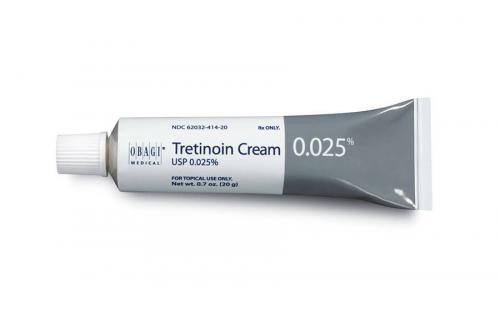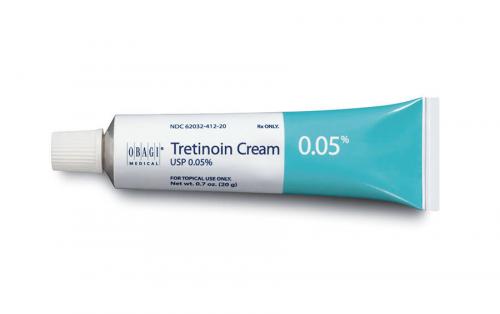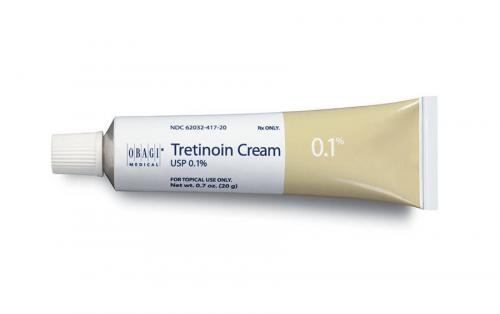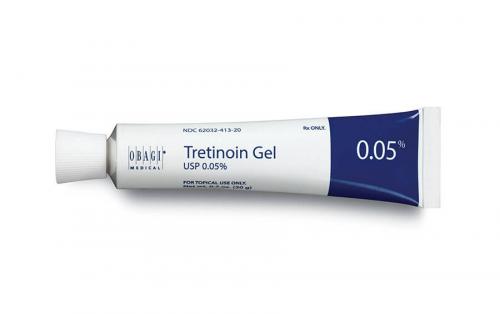A prescription topical treatment for acne vulgaris. Available in 3 strengths of Cream: 0.025%, 0.05%, and 0.1%; and one strength of Gel: 0.05%. Valid prescription required. Please see Important Safety Information below and Prescribing
Information for Tretinoin Cream and Gel.

Tretinoin Cream 0.025%
Tretinoin Cream in a 0.025% concentration. Valid prescription required. Please see Prescribing Information.
Active Ingredient:
0.025% Tretinoin
Not available in select states including MA, MT, NH, NY, and TX, due to state regulations regarding the ability of physicians to dispense prescription drug products in their offices.
Indication
Tretinoin Gel (0.05%) and Cream (0.1%, 0.05% and 0.025%) are used in the topical treatment of acne vulgaris.
Tretinoin is for use on the skin only. Do not get it in your mouth, eyes, vagina or the corners of your nose.
Important Safety Information
While using tretinoin, you should:
- minimize exposure to the sun and to extreme cold or wind. Avoid sunlamps, tanning beds and ultraviolet light.
- use a sunscreen with a SPF of at least 15, wear protective clothing and wide-brimmed hat
- stop using tretinoin if you get a sunburn
- avoid washing your skin too often, scrubbing the affected skin, or using other products with a drying effect, including other products containing tretinoin, unless recommended by your healthcare provider
Before using tretinoin, tell your healthcare provider if you:
- are allergic to fish (gel only). Contact your healthcare provider if you develop itching or rash while using tretinoin gel.
- have a skin condition called eczema
- have a sunburn
- are pregnant or breastfeeding, think you are pregnant, or plan to become pregnant or to breastfeed
What are the possible side effects of tretinoin?
- skin dryness, burning, redness, excessive flaking or peeling. If you develop these symptoms your healthcare provider may tell you to stop using it for a while, decrease the number of applications, or stop using it completely.
Tell your healthcare provider about any side effect that bothers you or does not go away.
The safety and efficacy of Tretinoin have not been established in the treatment of patients younger than 10 years of age (Gel) or 12 years of age (Cream), or in pregnant or nursing women.
You are encouraged to report negative side effects of prescription drugs to the FDA. Visit www.fda.gov/medwatch or call 1-800-FDA-1088.

Tretinoin Cream 0.05%
Tretinoin Cream in a 0.05% concentration. Valid prescription required. Please see Prescribing Information.
Active Ingredient:
0.05% Tretinoin
Not available in select states including MA, MT, NH, NY, and TX, due to state regulations regarding the ability of physicians to dispense prescription drug products in their offices.
Indication
Tretinoin Gel (0.05%) and Cream (0.1%, 0.05% and 0.025%) are used in the topical treatment of acne vulgaris.
Tretinoin is for use on the skin only. Do not get it in your mouth, eyes, vagina or the corners of your nose.
Important Safety Information
While using tretinoin, you should:
- minimize exposure to the sun and to extreme cold or wind. Avoid sunlamps, tanning beds and ultraviolet light.
- use a sunscreen with a SPF of at least 15, wear protective clothing and wide-brimmed hat
- stop using tretinoin if you get a sunburn
- avoid washing your skin too often, scrubbing the affected skin, or using other products with a drying effect, including other products containing tretinoin, unless recommended by your healthcare provider
Before using tretinoin, tell your healthcare provider if you:
- are allergic to fish (gel only). Contact your healthcare provider if you develop itching or rash while using tretinoin gel.
- have a skin condition called eczema
- have a sunburn
- are pregnant or breastfeeding, think you are pregnant, or plan to become pregnant or to breastfeed
What are the possible side effects of tretinoin?
- skin dryness, burning, redness, excessive flaking or peeling. If you develop these symptoms your healthcare provider may tell you to stop using it for a while, decrease the number of applications, or stop using it completely.
Tell your healthcare provider about any side effect that bothers you or does not go away.
The safety and efficacy of Tretinoin have not been established in the treatment of patients younger than 10 years of age (Gel) or 12 years of age (Cream), or in pregnant or nursing women.
You are encouraged to report negative side effects of prescription drugs to the FDA. Visit www.fda.gov/medwatch or call 1-800-FDA-1088.

Tretinoin Cream 0.1%
Tretinoin Cream in a 0.1% concentration. Valid prescription required. Please see Prescribing Information.
Active Ingredient:
0.1% Tretinoin
Not available in select states including MA, MT, NH, NY, and TX, due to state regulations regarding the ability of physicians to dispense prescription drug products in their offices.
Indication
Tretinoin Gel (0.05%) and Cream (0.1%, 0.05% and 0.025%) are used in the topical treatment of acne vulgaris.
Tretinoin is for use on the skin only. Do not get it in your mouth, eyes, vagina or the corners of your nose.
Important Safety Information
While using tretinoin, you should:
- minimize exposure to the sun and to extreme cold or wind. Avoid sunlamps, tanning beds and ultraviolet light.
- use a sunscreen with a SPF of at least 15, wear protective clothing and wide-brimmed hat
- stop using tretinoin if you get a sunburn
- avoid washing your skin too often, scrubbing the affected skin, or using other products with a drying effect, including other products containing tretinoin, unless recommended by your healthcare provider
Before using tretinoin, tell your healthcare provider if you:
- are allergic to fish (gel only). Contact your healthcare provider if you develop itching or rash while using tretinoin gel.
- have a skin condition called eczema
- have a sunburn
- are pregnant or breastfeeding, think you are pregnant, or plan to become pregnant or to breastfeed
What are the possible side effects of tretinoin?
- skin dryness, burning, redness, excessive flaking or peeling. If you develop these symptoms your healthcare provider may tell you to stop using it for a while, decrease the number of applications, or stop using it completely.
Tell your healthcare provider about any side effect that bothers you or does not go away.
The safety and efficacy of Tretinoin have not been established in the treatment of patients younger than 10 years of age (Gel) or 12 years of age (Cream), or in pregnant or nursing women.
You are encouraged to report negative side effects of prescription drugs to the FDA. Visit www.fda.gov/medwatch or call 1-800-FDA-1088.

Tretinoin Gel 0.05%
Retinoid indicated for the topical treatment of acne vulgaris. Contains micronized tretinoin in an aqueous gel composed of purified water, glycerin, and soluble collagen.* Valid prescription required. Please see Prescribing Information.
Active Ingredient:
0.05% Tretinoin
*Soluble collagen comprises methylparaben, propylparaben, ethylparaben, butylparaben, isobutylparaben, phenoxyethanol, fish collagen, and water. Use Obagi Tretinoin Gel with caution if allergic to fish.
Not available in select states including MA, MT, NH, NY, and TX, due to state regulations regarding the ability of physicians to dispense prescription drug products in their offices.
Indication
Tretinoin Gel (0.05%) and Cream (0.1%, 0.05% and 0.025%) are used in the topical treatment of acne vulgaris.
Tretinoin is for use on the skin only. Do not get it in your mouth, eyes, vagina or the corners of your nose.
Important Safety Information
While using tretinoin, you should:
- minimize exposure to the sun and to extreme cold or wind. Avoid sunlamps, tanning beds and ultraviolet light.
- use a sunscreen with a SPF of at least 15, wear protective clothing and wide-brimmed hat
- stop using tretinoin if you get a sunburn
- avoid washing your skin too often, scrubbing the affected skin, or using other products with a drying effect, including other products containing tretinoin, unless recommended by your healthcare provider
Before using tretinoin, tell your healthcare provider if you:
- are allergic to fish (gel only). Contact your healthcare provider if you develop itching or rash while using tretinoin gel.
- have a skin condition called eczema
- have a sunburn
- are pregnant or breastfeeding, think you are pregnant, or plan to become pregnant or to breastfeed
What are the possible side effects of tretinoin?
- skin dryness, burning, redness, excessive flaking or peeling. If you develop these symptoms your healthcare provider may tell you to stop using it for a while, decrease the number of applications, or stop using it completely.
Tell your healthcare provider about any side effect that bothers you or does not go away.
The safety and efficacy of Tretinoin have not been established in the treatment of patients younger than 10 years of age (Gel) or 12 years of age (Cream), or in pregnant or nursing women.
You are encouraged to report negative side effects of prescription drugs to the FDA. Visit www.fda.gov/medwatch or call 1-800-FDA-1088.